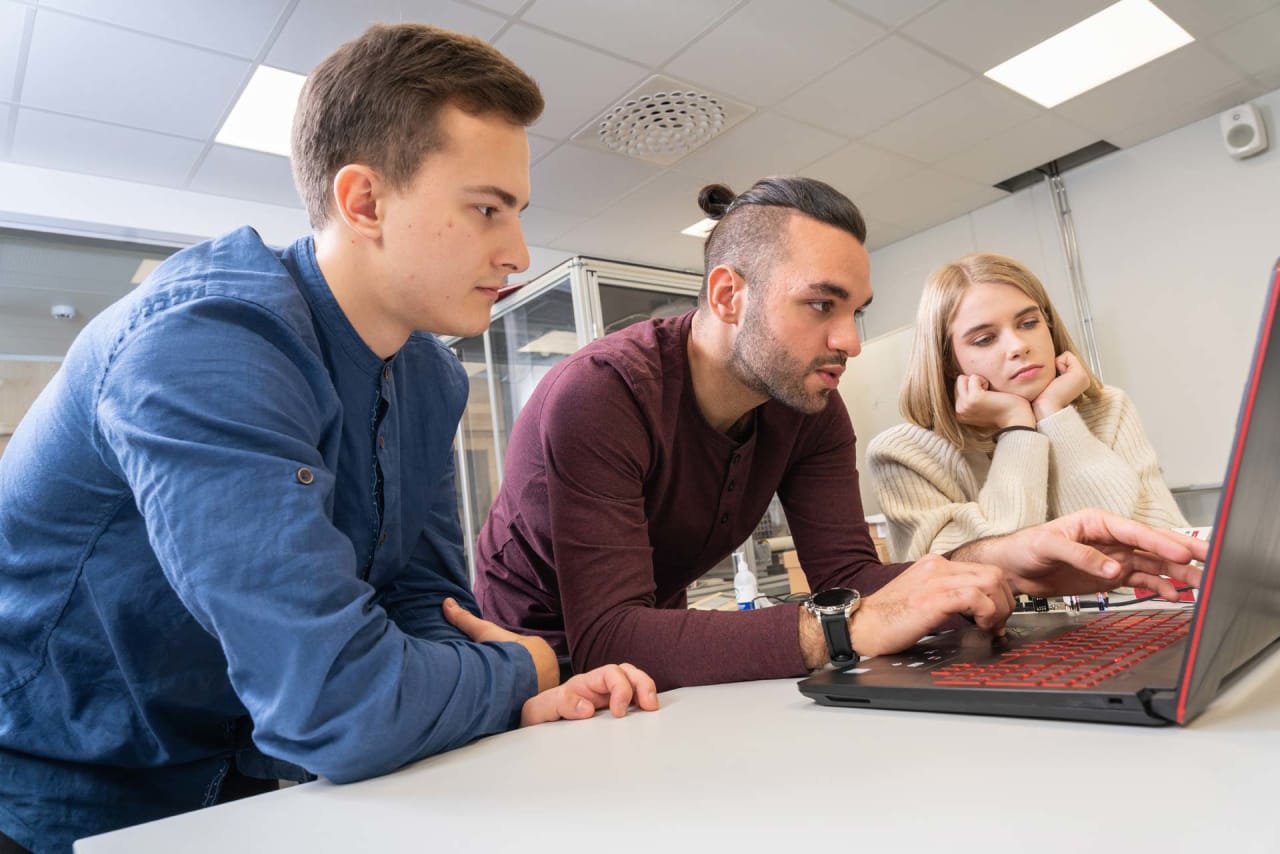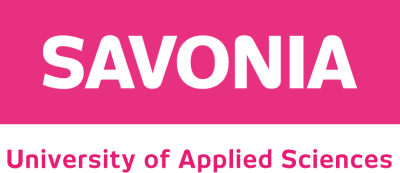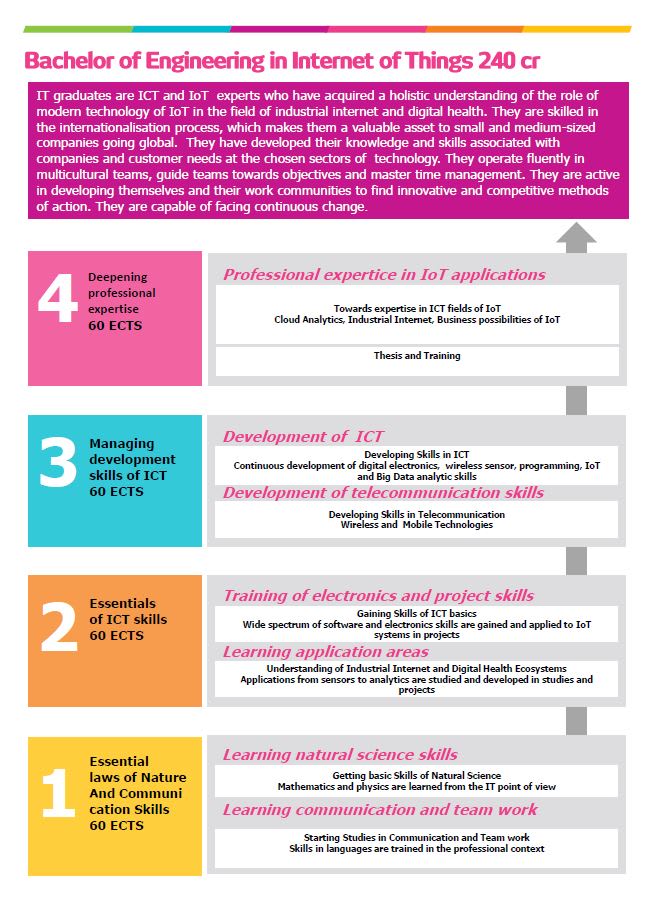
Bachelor of Engineering, Internet of Things
Savonia University of Applied Sciences

Key Information
Campus location
Kuopio, Finland
Languages
English
Study format
On-Campus
Duration
4 years
Pace
Full time
Tuition fees
EUR 8,000 / per year *
Application deadline
17 Jan 2025
Earliest start date
Aug 2025
* For non-EU/EEA citizens, per year. Scholarships available.
Introduction
Why study engineering at Savonia?

Name of the study programme: Information technology (Internet of Things) Degree title: Bachelor of Engineering Extent of the study programme: 240 credits City: Kuopio, Finland Mode of teaching: Full-time, on Campus Language: English Application period: January 2023
The Bachelor of Engineering, Information Technology (Internet of Things) programme aims to develop experts in information technology with the specialisation in the Internet of Things (IoT). The degree programme qualifies engineers to work in the fields of IoT and Big Data; especially, in companies operating within the digital health and industrial internet sectors. The duties of an IoT graduate may vary from software design to electrical engineering, the design of smart wireless devices, and the whole IoT system in the cloud.
Our programme incorporates the Conceive, Design, Implement, Operate (CDIO) method to enhance students process of acquiring deep engineering know-how while developing communication, interpersonal, social and teamwork skills. IoT graduates are prepared to work in international environments and teams.
Thesis
The thesis at Savonia is always work-related. This gives you a good opportunity to network with professionals in your field during your studies, and often the thesis turns out to be a starting point for your career.
The thesis emphasises the cooperation between you, working life and the UAS – from choosing the topic to set the goals and to actually doing it. During the process, you show that you are capable of working independently in recognising, evaluating and solving developmental challenges in working life. Professional reporting and communications skills are required as well. Your work-related thesis can be:
- a developmental project, which you or your team plan and implement based on the requirements of your client. Examples of such a project include product or service development, technology evaluations and testing, it can be software or hardware weighted, it can consist of the whole information chain from sensors to background system or it can some restricted part.
- a research-oriented project, where you or your team will perform appropriate research activities in order to shed light on the developmental or problem-solving needs of your client.
- a compiled thesis, where eg projects, research, development or scientific articles done during the studies are gathered together and reported as a synthesis.
Your thesis process will be supported by engineering studies, thesis seminars and methodology workshops. You can do your thesis independently or in a group.
Internationality
Our BSc -groups are multinational and -cultural by nature, so you will get accustomed to an international work environment from day one. In addition, the BSc programme itself is designed for internationalisation. Close cooperation with our international partners brings you in contact with people and organisations outside Finland, making it possible for you to compare views, share knowledge and work side by side on projects by using technology-based communication tools as well as meeting in person. Student exchange is also a natural and recommended part of your second-year studies, and internships (basic and/or professional) could take you anywhere in the world. Our selection of language studies is substantial, complemented by the offerings of the University of Eastern Finland. Cross-cultural studies provide a good basis for your personal experiences in all aspects of internationality.
Cooperation
Savonia is active in developing the surrounding community via, among others, student projects, joint research projects and various development programmes. The cooperation with the local working life is highly valued and based on long-term relationships. Also, the joint activities with the University of Eastern Finland and Karelia UAS bring a variety of options for our students. International aspects are dealt with in a close network of foreign partner institutions, covering exchange, internships, projects and joint or double degrees.
Research
Our BSc programme is dedicated to helping small and medium-sized businesses in their internationalisation efforts. You will work on various work-related research or developmental projects of SMEs during your studies and gain valuable insight into the industrial or digital health world.
Possibilities to continue studies after graduation
A BSc degree is an internationally recognized and approved qualification. A BSc graduate is eligible to apply to continue theoretical studies at most universities worldwide. Often the following Master’s degree can be completed in 2 years, depending on the field of study and the student. However, should you wish to continue your studies to the Master level at a university of applied sciences, you will be directed to start your working career to gather 3 years of work experience before entering a Master’s programme.
Admissions
Curriculum
Content of Studies
Each year has two assigned themes. During the first term of studies, the studies will cover issues in natural science, mathematics, physics and languages. This is done by working in cooperation with a partner organisation from the surrounding environment. The students will form teams around SMEs in cooperation with Savonia, and start getting to know the various phases needed for carrying out a project. These skills cover basic knowledge of different fields of ICT.
The second term continues with the development of applications within IoT. The student gains a profound insight into the successful implementation of IoT applications. Students will go through team building phases and become familiar with multicultural working teams and methods. The students are also expected to apply ICT knowledge to practice within the partner organisation and to be able to share their understanding with fellow students. At the end of the year, the students will have a comprehensive understanding of the entire ICT systems of IoT as a foundation to develop their professional career.
During the second year studies, the students will focus on essential internationalisation skills. First, the students will learn how to use the tools for software development and analysis in Big Data. Second, the students will put these skills and understanding to use, again together with local organisations, within the theme of preparing for training periods and projects.
The third-year students will focus on adapting professional level tasks in programming and electronics, wireless and cloud technologies. As skills and understanding grow, the students perceive the evaluation and development of demanding IoT applications professionally. By this stage, the students' management and leadership skills will grow to meet the demands of international level of the profession.
The fourth year is reserved for the thesis, training and business intelligence possibilities of IoT. Skills are deepened in cloud computing and analytics. The skills gained in previous years are sharpened in the
thesis and project work.
Structure of Studies
The studies for a Bachelor’s Degree in Information Technology comprise 240 ECTS. According to the curriculum, one academic year corresponds to 60 ECTS, which is equivalent to 1600 hours of a student’s workload. The studies consist, among others, of lessons in class, distance learning and independent studies as well as web-based learning and internship. The studies include working life oriented research and development activities.

Career Opportunities
Career possibilities
It BSc will work, among other things, in project, or sales engineering duties or research and related tasks. You will also have the skills and competencies needed to become an entrepreneur.
Titles:
- Product Developer or Manager
- Project Engineer
- Research engineer
- Web developer
- ICT specialist
- Sales Engineer
- Integration Engineer